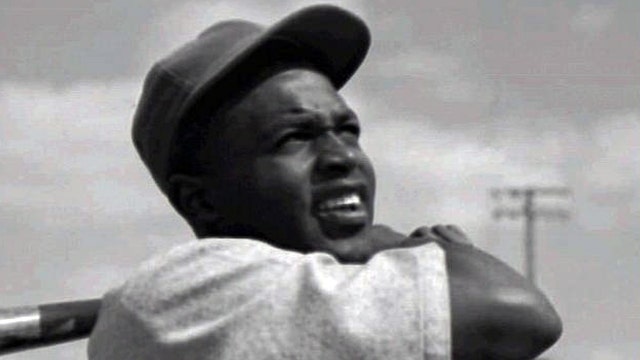The Five: The life of Jackie Robinson
The Five reflects on the life and civil rights legacy of Jackie Robinson
This is a rush transcript from "The Five," April 10, 2013. This copy may not be in its final form and may be updated.
BOB BECKEL, CO-HOST: Sixty-six years ago today, a young man named Jackie Robinson changed the course of sports history, becoming the first African-American to join a major league baseball team as a Brooklyn Dodger. Robinson, a son of a sharecropper, spent most of his 53 years striving for equality for himself and others.
We want to talk about the role he played in the civil rights movement.
But, first, let's look at some of the Hall of Famer's remarkable career.
(BEGIN VIDEO CLIP)
UNIDENTIFIED MALE: Whitey Ford feeds one to Jackie Robinson in the second. And the Dodger third baseman slams it deep to left center. Going, going, it's gone!
Brooklyn's Jackie Robinson helped the Dodgers win the national league pennant. And he helped himself to a pair of individual titles. The league's leading hitter and the league's most valuable player.
Jackie Robinson meant a thrill to the fans in the field or at bat. A pride to his race, Robinson is one more great name for the Hall of Fame.
(END VIDEO CLIP)
BECKEL: And he got in the Hall of Fame the first shot up.
I mean, let me just say a couple of things, Jackie Robinson and baseball, he was playing in Canada because he couldn't play in the United States. I give Branch Rickey an enormous amount of credit for bringing him on that team. He went on to do very well in the face of some horrible racism, not just in the South, in the North as well. In the South, he couldn't go to hotel rooms, in the North he was subjected to all this kind of stuff.
He kept his temper, did a remarkable job. That's one of the great leaders in civil rights. And, by the way, he got there a lot earlier and Branch Rickey, than the politicians ever did.
ERIC BOLLING, CO-HOST: Sure. Branch Rickey deserves a lot of credit too.
Obviously, Jackie Robinson is a phenomenal baseball player, deserved everything he earned. Just an awesome story. Branch Rickey, OK, great guy he did all that.
His son fired me. That's all I got to say.
(CROSSTALK)
BOLLING: I was -- I'm playing third base, I feed the ground the ball behind third. I threw to the first. I hurt my rotator cuff. His son Branch Rickey Jr. fired me on the spot, that night in the locker room.
KIMBERLY GUILFOYLE, CO-HOST: Said you're gone?
BOLLING: Off topic.
DANA PERINO, CO-HOST: Do you feel better now?
BOLLING: I feel better.
GUILFOYLE: He's a little emotional.
BOLLING: Branch Rickey, Sr., to bring him over. You're right, Bob, that was a huge, huge --
BECKEL: The other thing is, this happened 10 years before the Board of Education decision that allowed -- did away with separate but equal.
But also, it was 15 years before the civil rights legislation in Congress.
So, you've got to give sports some credit for this.
PERINO: I think, absolutely. I think sports and health diplomacy actually works better than political diplomacy, because it doesn't get anybody riled up or angry, it gets people fired up and excited before something, and you can get behind something. Or so, if you're making them excited about you team, that feeling of pride, or if you're helping heal somebody.
Those are the two things that work a lot better, and more quickly than political diplomacy.
BECKEL: You know, Greg, Martin Luther King said he learned from Jackie Robinson, the idea of nonviolence, because Robinson at any point could - and any other human being who wasn't as good as he was, would have exploded at some of this stuff. And King learned a lot from him, I think a lot of people did.
GREG GUTFELD, CO-HOST: Yes, I think one reason why it was able to happen in sports sooner than politics was because there are no Democrats in sports.
(LAUGHTER)
BECKLE: I ask you a serious question. All those Democrats.
GUILFOYLE: I think he's to be admired as much for his athletic prowess, and ability on the field as he is for his character as a man. I mean, he was a religious man, great family life. And really endured so much as -- the racism and growing up and working through that, he said he had to do a lot to overcome his resentment and anger, the way he felt, the way he was treated. He was able to do that and still perform. I think that's very admirable. I hope the movie does it justice.
BECKEL: And let's keep in mind it was after baseball was over, he was active in the civil rights movement until the day he died. He talked to every president about it. He is a remarkable, was a remarkable human being, he deserves every credit he gets. And I hope it's a good movie and you all go watch it.
Content and Programming Copyright 2013 Fox News Network, LLC. ALL RIGHTS RESERVED. Copyright 2013 CQ-Roll Call, Inc. All materials herein are protected by United States copyright law and may not be reproduced, distributed, transmitted, displayed, published or broadcast without the prior written permission of CQ-Roll Call. You may not alter or remove any trademark, copyright or other notice from copies of the content.






















